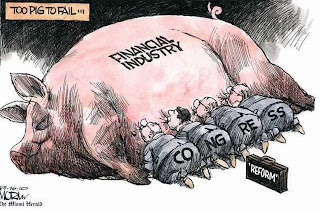“The complaints of the privileged are too often confused with the voice of the masses...The man who is admired for the ingenuity of his larceny is almost always rediscovering some earlier form of fraud. The basic forms are all known, have all been practiced.”
John Kenneth Galbraith
"It is difficult to get a man to understand something, when his salary depends upon his not understanding it."
Upton Sinclair
This is not quite as complex as it seems, at least in my thinking with regard to the principles of the fraudulent aspects of it. The complexity comes in the implementation of the trading code, not in the design of the system. I have been in groups that have taken on much hairier network and computing problems, and I know what
self-induced complexity looks like, and understand its true purpose.
I thought the example of line jumping for concert tickets in the video was a fairly good metaphor from which to start thinking.
It is all about a lack of transparency, asymmetry of information, and special rules for certain people who are 'connected' in the traditional sense.
So you establish top down market principles of transparency and equal protection. You place an order and it has a fixed life of one second. Everyone has the same privileges of trading in the same priorities and monetary units, that is, everyone can trade to the whole cent, or the tenth of a cent with equivalent fill priority. And everyone knows what the other players can know when they know it.
Yes the exchange can make money by selling certain key information to the highest bidder, but in doing so it has just undermined the integrity of the exchange, so too bad.
Exchanges are utilities operating under license like other utilities, and not spying agencies or extortionists who happen to run an exchange. And if you don't want to be a utility operating within certain constraints, find some other business.
Transparency and equality. Wow, what arcane concepts.
And a very nominal fixed transaction tax of five cents per every order placed, like a toll, to fund the costs of regulation of the exchange, would be quite effective, in addition to some fundamental
hysteresis on every order as described above.
Most of the complexity is unnecessary and designed for asymmetric advantage for insiders, and not for
liquidity which is the great bogeyman of the Street. HFT is predatory in nature and provides no liquidity. Liquidity is not volume, it is the money that stands in the market in the locus of genuine price discovery, and stands its ground on that, and not on the next price tick.
You have to ask,
what is the purpose of this system? And if the answer is fairness and soundness of price discovery, and not making the most money for powerful insiders, the answers start to clarify from first principles. These used to be called moral values.
Some fairly simple changes would fix all this, based on fundamental concepts like
transparency and equal protection. The problem is that politicians and private firms make enormous sums by taking some 'vig' or
vigorish from each and every trade by the 'dumb' or outsider money.
Most frauds have a lot of flash and dazzle for misdirection, but deep down they are always shockingly simple, and most often based on time honored cheats.
Eliot Spitzer and Bill Black certainly 'get this.' Lots of good people do. But the Banks use their friendly politicians and the power of money to isolate them. Just denying access to key careers or events is often enough to obtain most people's silence. This is how the status quo perpetuates itself, with money and the credibility trap. It is not dissimilar to organized crime.
The regulators should be ashamed, but they can point to the politicians, and the politicians can take the 'CEO defense' of not understanding what is going on. And the band plays on. There is some hope that the institutions might start using their leverage more effectively in their fiduciary roles, because without them the game ends. They are the 'marks' and their naivete is the criminal's incentive.








































